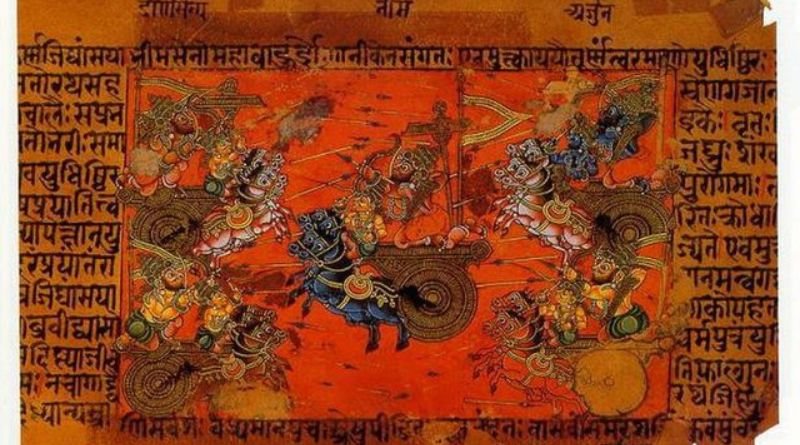
In a realm transcending the clash of steel and flesh, the Mahabharata unfolds—a tapestry woven with the threads of righteousness and ambition, loyalty and betrayal, duty and desire. This Indian epic stands as a profound testament to the intricate layers of the human experience, offering timeless lessons resonating even in our contemporary world. Let’s embark on a journey through this captivating saga, unveiling its essential teachings that guide us through the shadows and light of our own lives.
1. Dharma: Illuminating the Moral Pathway: At the epicenter of the Mahabharata beats the unwavering heart of Dharma—righteousness, ethical conduct, and the fulfillment of duty. The clash between the Pandavas and the Kauravas pivots on this pivotal concept. The Pandavas, led by the righteous Yudhishthira, ardently uphold Dharma despite facing deceit and exile. In contrast, the Kauravas, consumed by ambition and greed, abandon Dharma, paving the way for their tragic demise.
Diving into the Narrative: Draupadi’s public humiliation in the Kaurava court becomes a crucible for Yudhishthira. Witnessing his wife’s suffering, he chooses to honor his oath of not gambling until their exile concludes. This steadfast commitment to Dharma, even amid personal agony, exemplifies the profound power of upholding righteousness.
2. The Family Fortress: Bonds Beyond Bloodlines: Amidst the shadows of conflict and betrayal, the Mahabharata casts a radiant light on the unyielding strength of familial bonds. The loyalty among the Pandava brothers, despite their individual flaws, exemplifies the potent force of brotherhood. Draupadi’s unwavering devotion to her husbands underscores the resilience of marital love and fidelity. Even within the Kauravas, Karna’s steadfast loyalty to Duryodhana, despite the latter’s faults, paints a complex portrait of familial obligation.
Narrative Snapshot: Post Yudhisthira’s loss in the game of dice, the Pandavas remain a united front, supporting each other through exile and adversity. This unbreakable bond, forged in love and mutual respect, becomes their pillar of strength against insurmountable odds.
3. Conquering the Mind: Harnessing Desire and Ego: The Mahabharata serves as a profound allegory for the internal battles within ourselves. Duryodhana’s downfall warns against unchecked ambition and ego. Arjuna’s initial hesitation to fight kin underscores the internal struggle between duty and personal attachments. The epic underscores the importance of mastering desires and controlling ego for inner peace and harmony.
A Glimpse into the Narrative: Krishna’s discourse in the Bhagavad Gita becomes a timeless roadmap for conquering mental battles. Emphasizing detachment from desires, equanimity in challenges, and focusing on one’s Dharma, it provides a blueprint for self-realization.
4. The Art of Forgiveness: Embracing Compassion: Amidst the shadows of war, the Mahabharata reminds us that forgiveness can bloom. Yudhishthira’s choice to forgive Ashwatthama, the murderer of his sons, highlights the transformative power of letting go of vengeance. Draupadi’s understanding of Karna’s tragic circumstances reveals the potential for healing past wounds through empathy.
Illustrative Episode: Post-war, Yudhishthira, despite grief and anger, chooses to spare Ashwatthama’s life and grants him exile. This act of forgiveness, driven by a search for higher meaning amid carnage, showcases the transformative power of breaking the cycle of revenge.
5. The Fleeting Nature of Everything: Embracing Change: The Mahabharata’s narrative unfolds against the canvas of constant change and loss. Empires rise and fall, loved ones vanish, and victories slip away with cruel twists of fate. Amidst these realities, the epic reminds us of life’s impermanence, urging us to cherish the present, embrace change courageously, and accept that all things, even suffering, are fleeting shadows on the cosmic tapestry.
Snapshot of the Narrative: Post the victorious war, the Pandavas confront the desolation of a battlefield strewn with casualties, including loved ones from both sides. This poignant scene underscores the transient nature of human life, urging us to find meaning beyond material victories.
The Mahabharata transcends being a mere historical account or thrilling yarn; it’s a living tapestry woven with timeless wisdom. By delving into its lessons, we equip ourselves to navigate the complexities of the human experience, fostering personal growth, stronger relationships, and a more meaningful existence.
Incorporating Mahabharata’s Teachings into Our Lives
In Relationships:
- Cultivate unwavering loyalty and support: Stand by your loved ones through thick and thin, offering unwavering support and guidance. Foster trust and open communication, ensuring connections rooted in mutual respect.
- Practice forgiveness and compassion: Embrace the power of forgiveness in close relationships, letting go of resentment and seeking reconciliation. Practice empathy and understanding, seeing things from your loved one’s perspective.
- Prioritize selflessness and sacrifice: True love often thrives on putting others’ needs before your own. Make sacrifices for the happiness of your loved ones, strengthening bonds through acts of generosity.
In Work and Personal Growth:
- Embody unwavering dedication and ethics: Approach work with integrity and commitment, guided by a strong sense of purpose and ethical conduct. Let Dharma be your compass, upholding fairness and honesty in all dealings.
- Strive for continuous learning and self-improvement: Be a lifelong learner, seeking knowledge and personal growth. Embrace challenges as opportunities to hone your skills, striving to become the best version of yourself.
- Conquer the mind and master emotions: Control your thoughts and emotions through mindfulness and meditation. Cultivate inner peace, avoiding impulsive decisions and negativity, making clear-headed choices guided by reason and wisdom.
In Challenges and Adversity:
- Maintain unwavering belief in righteousness: Even in darkness, never lose sight of your values. Uphold Dharma, fighting for what you believe in with unwavering conviction.
- Embrace equanimity and acceptance: Accept challenges with grace and resilience, understanding their temporary nature. Find solace in the knowledge that brighter days lie ahead.
- Seek guidance and support: During tough times, seek guidance from mentors, friends, or spiritual communities. Sharing burdens and connecting with others provides strength and perspective, helping navigate hardships.
Beyond the Individual:
The Mahabharata inspires us to leverage personal growth for positive societal change:
- Promote justice and ethical conduct: Advocate for fairness and righteousness in all spheres of life. Speak against injustices, contributing to a more equitable society where everyone has a chance to thrive.
- Foster compassion and understanding: Extend empathy and respect to all beings, celebrating diversity. Promote kindness and inclusivity, working towards a world where everyone feels valued and accepted.
- Seek peaceful resolutions to conflict: Choose dialogue and understanding over aggression. Actively seek peaceful resolutions to personal and societal conflicts, understanding that violence often begets more violence.
The Mahabharata isn’t a static relic of the past; it’s a vibrant companion on our life’s journey. Its lessons provide a compass, guiding us through shadows and light, reminding us of our strengths and responsibilities. By embracing its wisdom, we navigate life’s complexities with clarity, purpose, and compassion, contributing to a world where righteousness shines brightly, illuminating the path towards a brighter future.



